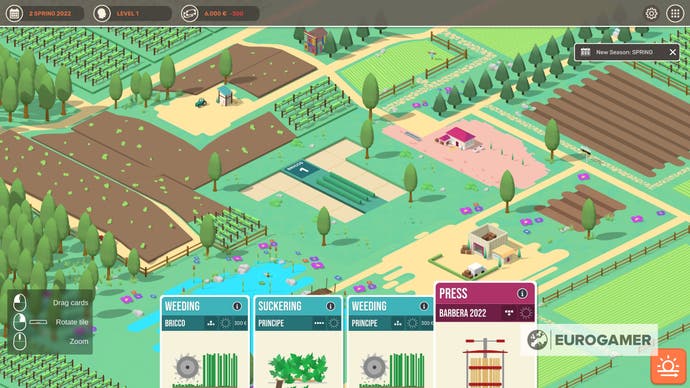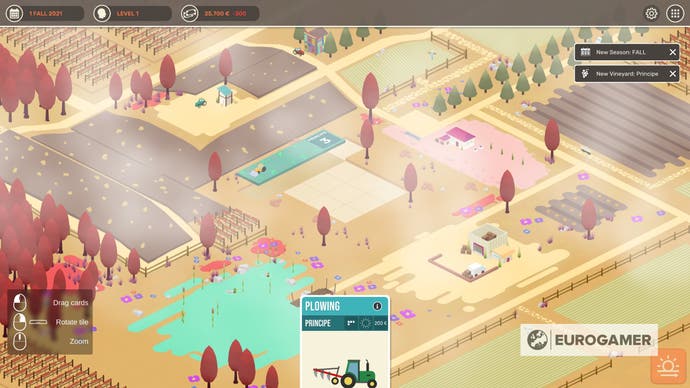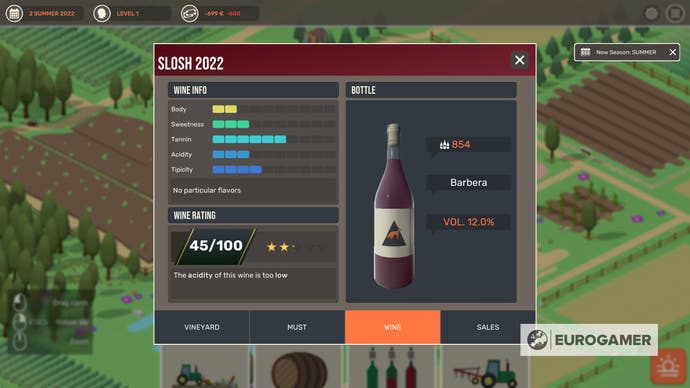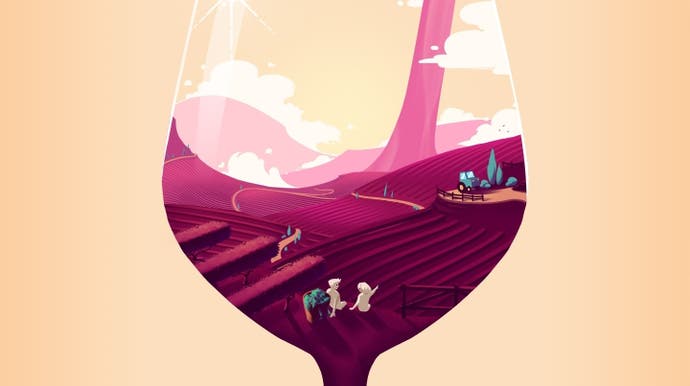Making horrible wine in the sunshine, in Hundred Days
Gulp.
Chris: William Goldman, who wrote so many good things, once came up with a movie about a bottle of wine. It got made, too. I gather nobody saw it. In one of Goldman's books, he mentions that even his own kids didn't see it. A total bomb.
In honour of this film - which I haven't seen either - I named my first winery Goldman Wines. Fittingly, Goldman Wines has been a bit of a disaster. But it's been fun too.
Hundred Days is a game about making wine. Last week a demo for it was available as part of Steam's Game Festival and I gave it a bit of a tinker. It's sort of a card game and sort of a Tetris thing. You make wine by playing cards, and once you've played the cards on a grid they take up a certain amount of space. You can have fun fussing around with the grids and the cards, all of which take up spaces of different shapes, to fit as many cards into the playing area as possible. It's a nice way of creating a sense that you have more that you could do as a winemaker than you have the time or the space or the money to do. It's the right kind of frustrating.
Outside of the Tetris/cards thing, Hundred Days takes you through the wine making process as you buy land, look after it, plant crops, tend them, and then turn the grapes into wine. It's a tricky business, and Hundred Days makes each step feel like a choice. I like fiddling with the various elements that monitor what kind of wine I'm going to end up with. And then I like trying to sell the awful wine I've made to some idiots.
It's charming, actually, a lovely game with a nice layout and presentation and a witty script. I'm already trying to learn how to keep the money coming in, which means making wines that people will like, and successfully getting the good stuff into the bottle. A movie about a bottle of wine sounds like a bit of a yawn, then, even if William Goldman is writing it. But a game? It works.
Bertie: I really wasn't expecting Hundred Days to be like this. I thought it would be overly complicated, stuffy, dull. But it's not at all. The moment you dip in, it's all cartoon brightness and bizarre conversations with your neighbour, who's so keen on saying "oh girl" it's like I'm in an episode of Drag Race (and wouldn't that be a crossover?). And it works so well. Not only does it give Hundred Days a chirpy kind of charisma, and a warm and alluring A Place in the Sun vibe, it also helps break the complex world of winemaking into palatable bites.
The bites are, as Chris mentioned, the cards you play. They are your processes: your weeding, your ploughing, your harvesting and even your bottling and wine tasting. It sounds complicated, but as there are only usually two or three cards in your hand at any one time, it never feels like it. Even when you expand into another field, and start juggling the manufacturing of one harvest while working on another, it never feels heavy. Decisions are usually either/or, and bit by bit, little learnings - actual winemaking knowledge - sinks in.


That doesn't mean it's easy. I've played the demo a few times and I've never ended the roughly three-year playing time with anything approaching a sustainable business. I either pump too much money into research, and can't afford to harvest my crops, or don't put enough money into research and hit a, um, production bottleneck. It's a balance I haven't been able to get, yet.
Still, more orders are coming in. I've done a big deal with a supermarket, probably Carrefour, albeit at a discount, and the smaller buyers seem to keep coming. And guess what? My wine is getting better. I made a three-star batch just now. That's got to be better than Oyster Bay, hasn't it? The tannin levels were too high but I can work on that, I know what to do.
Red Fox winery, the one with the little fox on the label. Remember that name. We're going to change the winemaking world.



